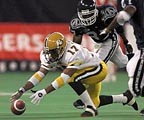
Play It Safe and Win
Safety problems are like a turnover in football. Two teams can play almost evenly, but the one that turns the ball over the most, or misses the one tackle on the punt return, generally will lose the game. Similarly, most contracting companies in the same "league" run their estimating and project management about the same way. What often makes one company much more successful is a management that avoids mistakes. One bad safety incident on a job can ruin your profit margin, as well as someone's life.
We all get away with carelessness here and there. But on the jobsite, the costs of one mistake can be great. Safety does pay. Train your people to look out for hazards and the other guy. It's nice to have some "animals" on the crew who are willing to try anything, but you need to train them to work within their capabilities. None of us wants people getting hurt because they were doing something they shouldn't have been doing in the first place.
Some Thoughts on Success
Success often is a matter of common sense applied to everyday life - but how do you improve your own "success" rate? The business management experts at Printhouse Corp. offer a list of success secrets taken from years of often-painful learning.Thank people. Never forget to say thank you to anyone who has done you a favor, large or small. A written thank-you note is one of your most powerful success tools.
Show up. Often, nothing beats a face-to-face meeting. Do your best to communicate in person with your clients whenever possible.
Don't delay. Don't let small problems fester. It's better to deal with today's molehill before it turns into tomorrow's mountain.
Master minutiae. While others are wasting their time, spend yours getting to know your industry inside out. It'll pay off later.
Build credibility. Talk to experts in your field. They can be easier to contact than you may think.
Communicate your commitment. If you can't show people you're committed to your ideas, they won't be willing to expend much energy toward helping you reach your goals.
Manage your time. Focus on what you need to accomplish. Distractions and interruptions may require your immediate attention throughout the day, but be sure not to lose sight of your overall goal.
Be kind. Don't try to show people up; they'll spend their time looking for ways to get even.
Cultivate allies. Don't waste your time trying to convert doubters who will never see your point of view. Instead, work on developing strong support among your allies.
Results. Don't let the niceties of life get in the way of results. Minding your manners is important, but remember that sometimes it's necessary to get mad.
The September Bandwagon
In case you've got nothing else to do this month, there's a bunch of causes that would love your participation. We list 30 so you can devote one full day to each. September is National ?p>- Cholesterol Education Month
- Children's Eye Health and Safety Month
- Library Card Sign-up Month
- Piano Month
- Food Safety Education Month
- Prostate Health Month
- Organic Harvest Month
- Sickle Cell Awareness Month
- Baby Safety Month
- Honey Month
- Childhood Cancer Month
- Sewing Month
- Nutrition Month
- Hispanic Heritage Month
- Rice Month
- Alcohol and Drug Addiction Recovery Month
- Muscular Dystrophy Awareness Month
- Coupon Month
- Ovarian Cancer Month
- Literacy Month
- Disability Awareness Month
- Reye's Syndrome Month
- Healthy Aging Month
- Leukemia Month
- Pediculosis Prevention Month
- Native American Wellbriety Month
- Ulcer Awareness Month
- Childhood Injury Prevention Month
- Farm Animal Awareness Month
- Lice Prevention Month
That should keep you busy and out of trouble - until October.

The Safest Cars You Can Buy
Generally speaking, when it comes to buying a safe car, bigger is better. According to the National Highway Traffic Safety Administration (NHTSA), these are the seven safest vehicles on the road today:- Ford F-150
- Chevrolet Impala
- Honda Accord
- Lincoln LS
- Lincoln Town Car
- Volkswagen Passat
- Volvo S80
Disclaimer: These NHTSA ratings are the result of crash test experiments that took place under carefully controlled, laboratory-type conditions. Individual results you realize on actual roads in the presence of idiot drivers may vary.
Avoid the Fatal Flaws
University of Southern California business management professor Morgan McCall says there are 10 fatal flaws that separate unsuccessful managers from successful ones. They are:
1. Insensitivity - using an abrasive, intimidating or bullying style.
2. Aloofness - having a condescending attitude.
3. Betrayal of trust - talking behind peoples' backs.
4. Over-managing - inability to delegate tasks.
5. Over-ambition - trying too hard to get ahead.
6. Lack of long-term plan - too focused on immediate results at the expense of the big picture.
7. Inflexibility - inability to adapt to changes.
8. Over-dependency on mentor - unwillingness to take initiative.
9. Poor hiring decisions - hiring only mirror images of themselves.
10. Poor crisis management - inability to handle problems.
McCall says these fatal flaws usually become visible early on. He also says that such flaws are becoming more deadly these days because competitiveness makes leadership skills a vital trait for all managers.
Quick Tips on Attitudes
Noted authority Dr. Wolf Rinke was kind enough to share his thoughts on people's attitudes and their impact on our business and personal lives.- Attitudes are created.
- A positive attitude is the one characteristic that all successful people have in common.
- Research has demonstrated that a positive attitude can strengthen the immune system, ward off illness, help fight disease, and influence healing and recovery from long-term illness.
- Positive people are energizers. Negative people are energy robbers.
- Individuals can learn to change their attitude response patterns.
- Research provides evidence that the mind and body are connected and that both have the ability to think.
- Attitudes are infectious.
- A positive attitude is developed and maintained by:
- starting your day on a positive note;
- using positive greetings;
- expecting the best;
- setting yourself up for success;
- avoiding perfectionism.

Keep the Family Business in the Family
One threat to continuing control of a family business is the risk that a family member may get divorced and lose part of the business in the settlement. Experts say to be sure that the shares in the business that are owned by family members are not marital property that would be subject to division in the event of a divorce.Shares are not marital property when:
- They were owned before marriage.
- They are received after marriage by gift or inheritance.
- They are purchased after marriage with separately owned funds that were owned before marriage, or funds received by gift or inheritance during marriage (something that can be very difficult to prove).
Shares are marital property when:
- Bought with funds earned during marriage.
- Received as compensation earned during marriage, as through a bonus or stock option program.
Transfer shares to children and other family members by gift or inheritance - not by sale or by having the business grant them through its compensation plan. Consider using trusts to clarify ownership.
Important: Check with a qualified expert about how laws may apply to your specific situation.
About Those Non-compete Clauses
Many employers obtain a written agreement from select employees who agree not to compete with the employer for a specific period of time after they leave the company, and usually within a certain geographic area.The courts have consistently found reason not to honor very restrictive covenants because of the hardship they wreak on employees.
One case demonstrates just how restrictively these covenants are construed by the courts. A young man went to work for a contractor and signed an agreement not to compete as a contractor for two years after leaving his current employer, and within a 20-mile radius. The young man left his employer and started working for a competitor just a few miles away.
The court refused to enforce the covenant not to compete, because to do so would have restricted the young man from earning a living. This case continues the trend toward limiting the right of an employer to prevent former employees from competing when they leave.
Report Abusive Comment